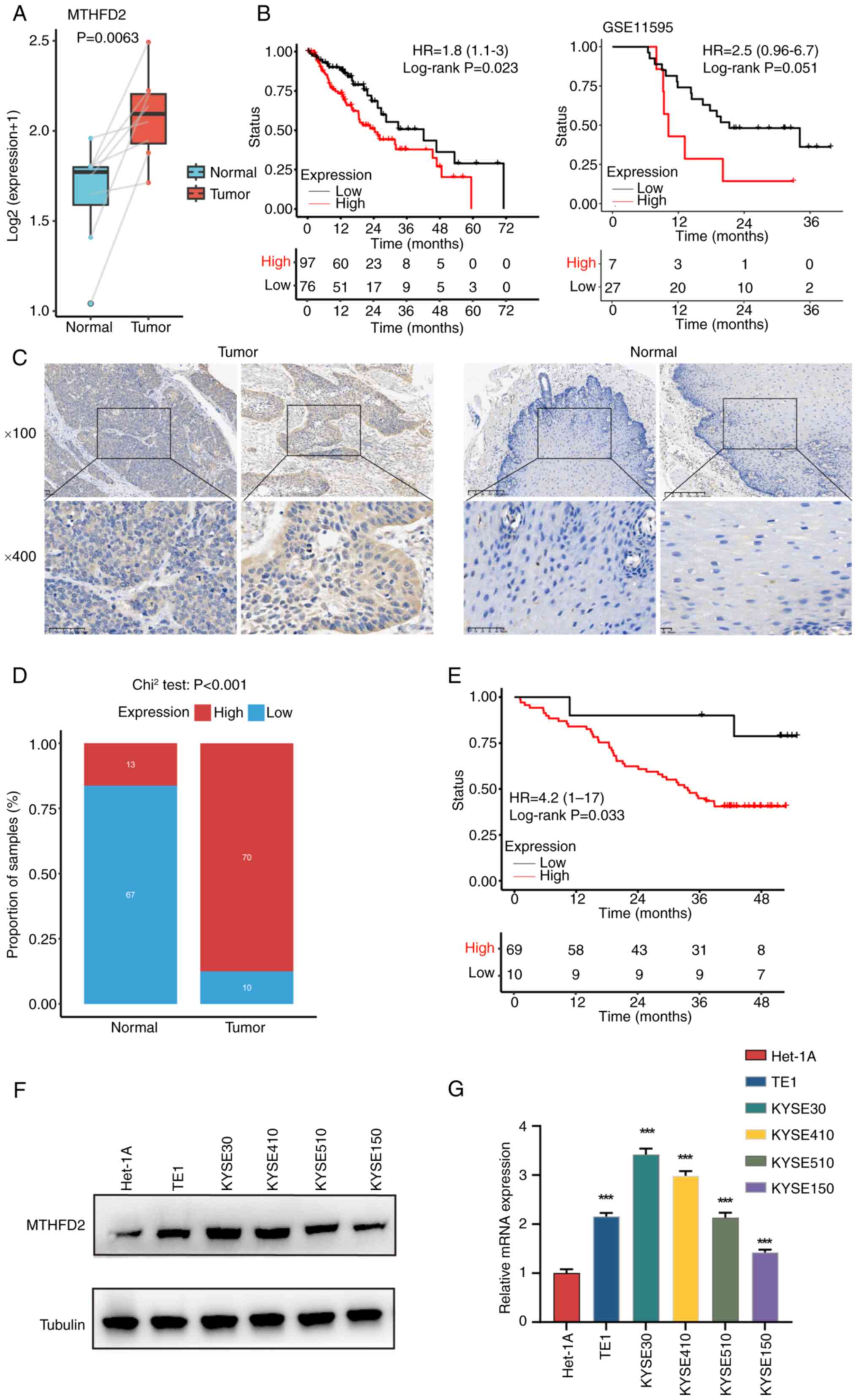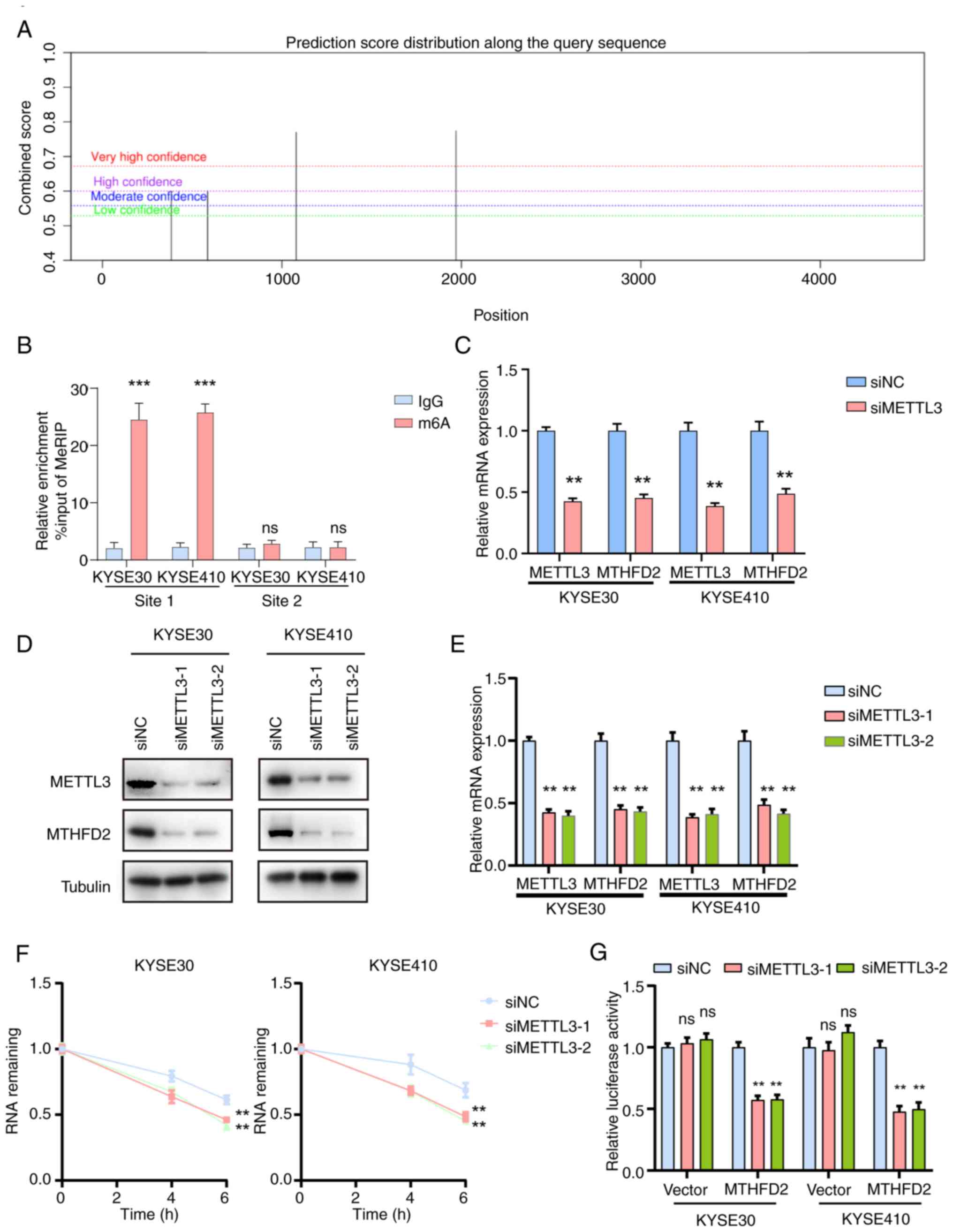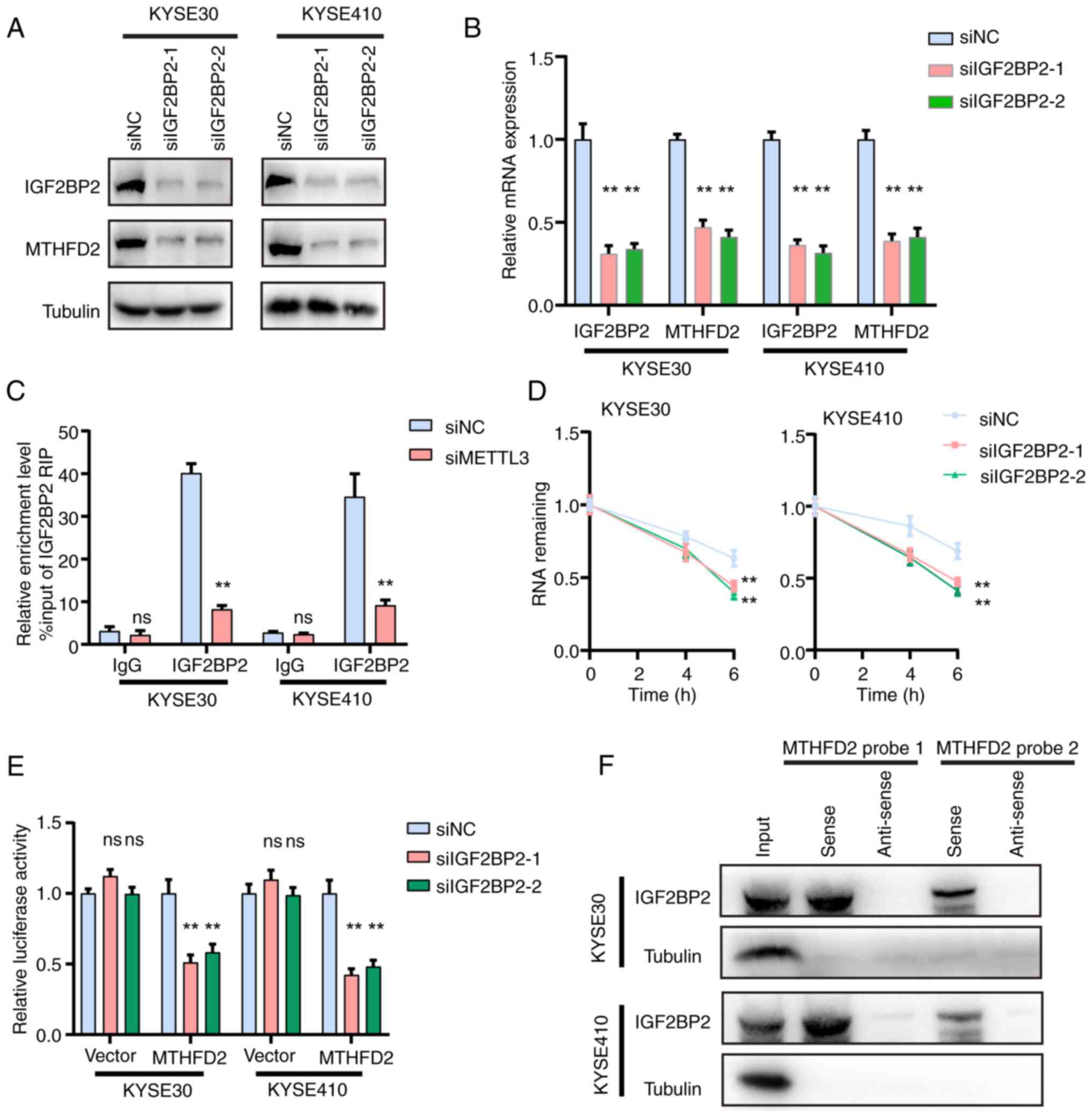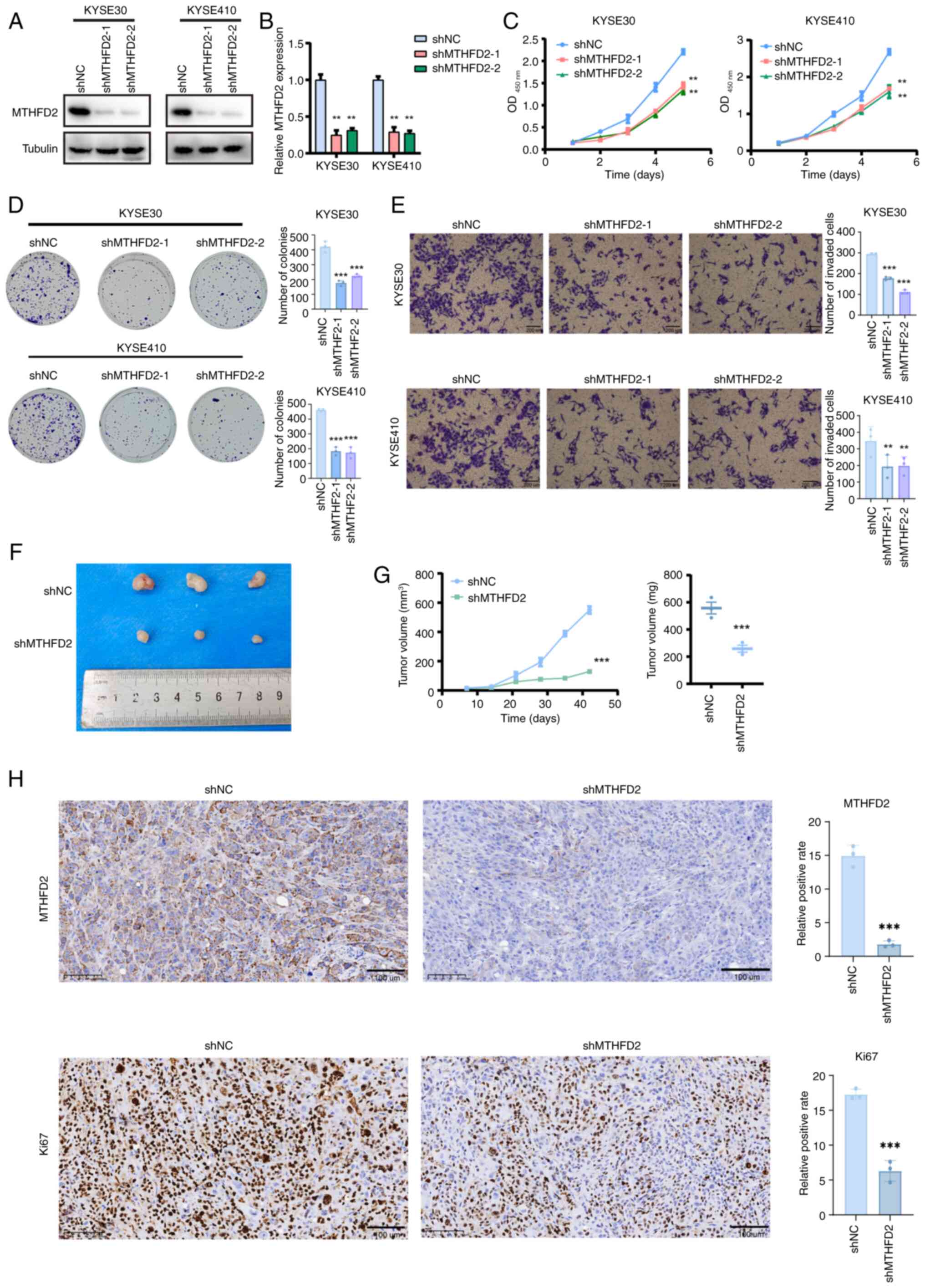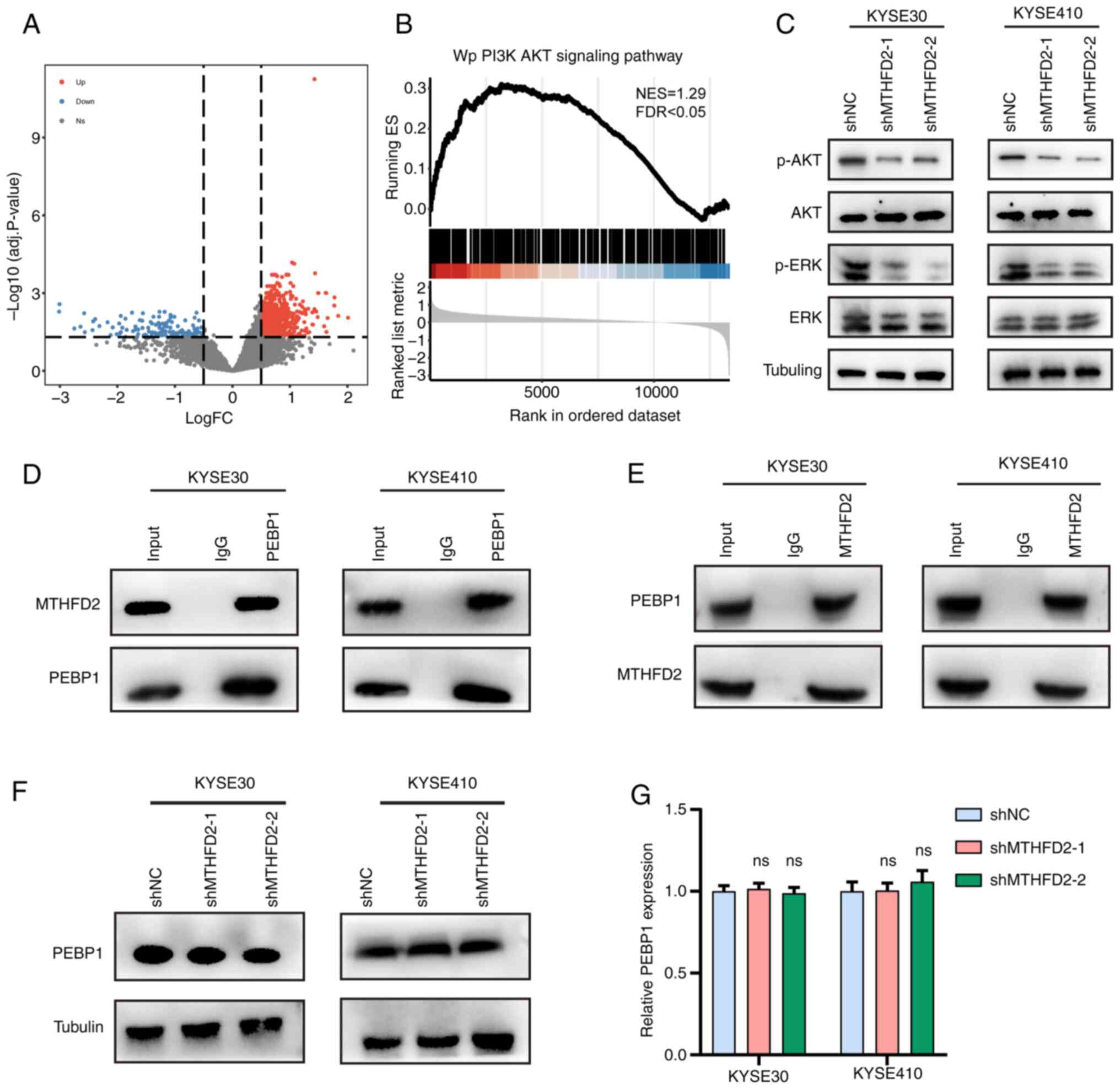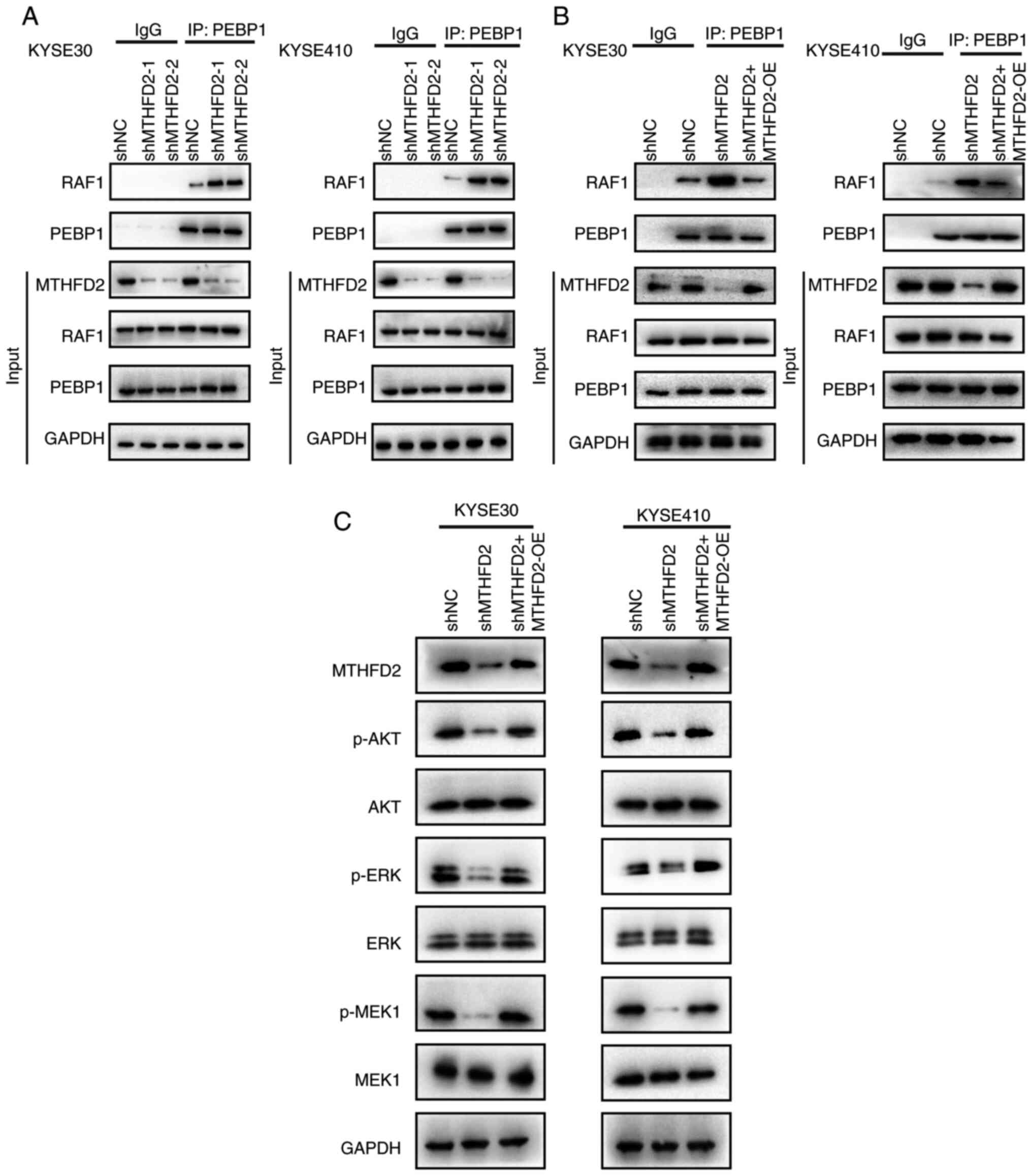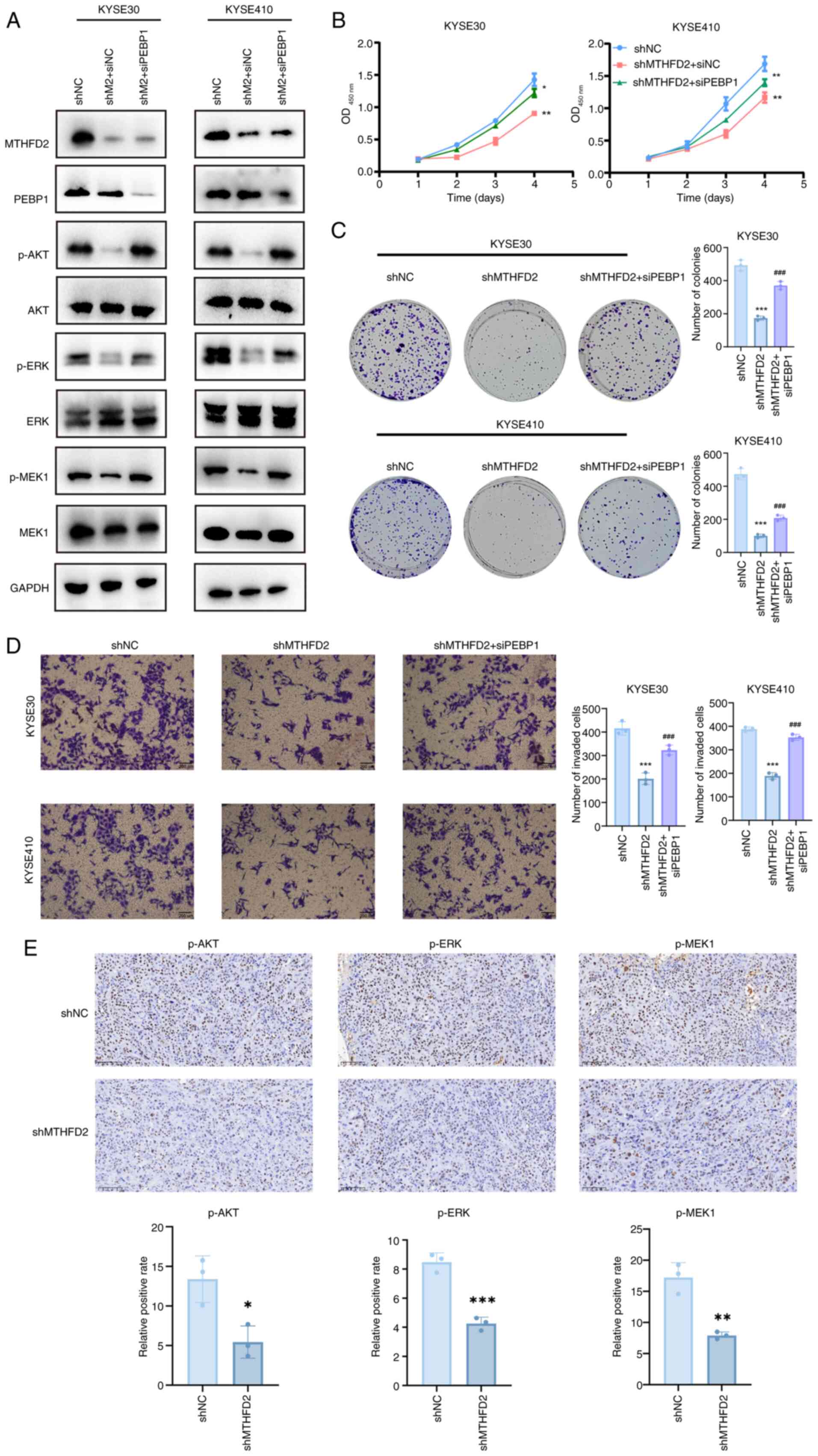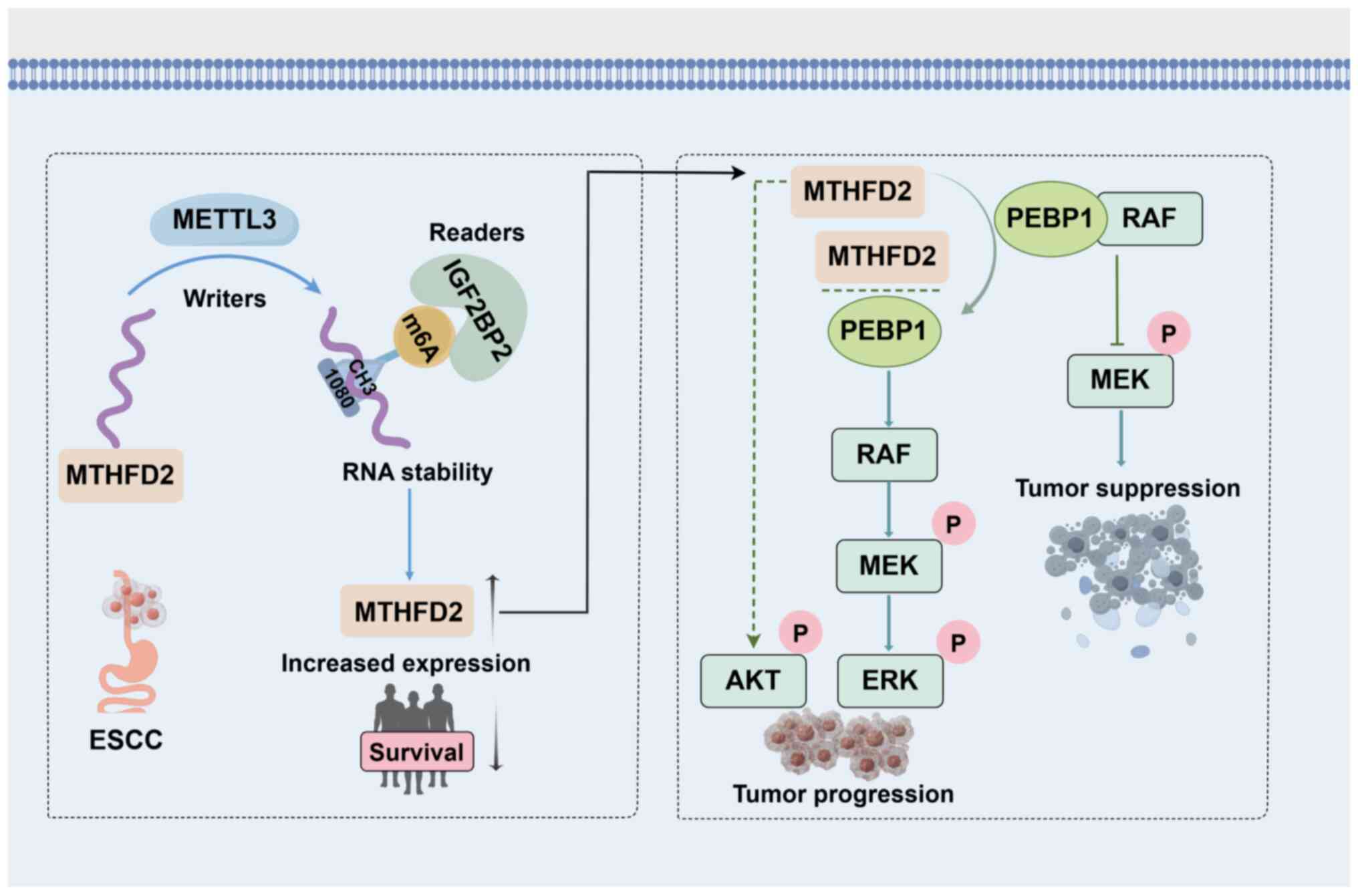|
1
|
Sung H, Ferlay J, Siegel RL, Laversanne M,
Soerjomataram I, Jemal A and Bray F: Global Cancer Statistics 2020:
GLOBOCAN estimates of incidence and mortality worldwide for 36
cancers in 185 countries. CA Cancer J Clin. 71:209–249. 2021.
View Article : Google Scholar : PubMed/NCBI
|
|
2
|
DaSilva LL, Aguiar PN Jr and de Lima Lopes
G: Immunotherapy for advanced esophageal squamous cell
carcinoma-renewed enthusiasm and a lingering challenge. JAMA Oncol.
7:1613–1614. 2021. View Article : Google Scholar : PubMed/NCBI
|
|
3
|
Li Y, Yang B, Ma Y, Peng X, Wang Z, Sheng
B, Wei Z, Cui Y and Liu Z: Phosphoproteomics reveals therapeutic
targets of esophageal squamous cell carcinoma. Signal Transduct
Target Ther. 6:3812021. View Article : Google Scholar : PubMed/NCBI
|
|
4
|
Jiang K, Yin X, Zhang Q, Yin J, Tang Q, Xu
M, Wu L, Shen Y, Zhou Z, Yu H and Yan S: STC2 activates PRMT5 to
induce radioresistance through DNA damage repair and ferroptosis
pathways in esophageal squamous cell carcinoma. Redox Biol.
60:1026262023. View Article : Google Scholar : PubMed/NCBI
|
|
5
|
Pavlova NN, Zhu J and Thompson CB: The
hallmarks of cancer metabolism: Still emerging. Cell Metab.
34:355–577. 2022. View Article : Google Scholar : PubMed/NCBI
|
|
6
|
Locasale JW: Serine, glycine and
one-carbon units: Cancer metabolism in full circle. Nat Rev Cancer.
13:572–583. 2013. View
Article : Google Scholar : PubMed/NCBI
|
|
7
|
Pan S, Fan M, Liu Z, Li X and Wang H:
Serine, glycine and one-carbon metabolism in cancer (Review). Int J
Oncol. 58:158–170. 2021. View Article : Google Scholar : PubMed/NCBI
|
|
8
|
Ducker GS and Rabinowitz JD: One-carbon
metabolism in health and disease. Cell Metab. 25:27–42. 2017.
View Article : Google Scholar :
|
|
9
|
Nilsson R, Jain M, Madhusudhan N, Sheppard
NG, Strittmatter L, Kampf C, Huang J, Asplund A and Mootha VK:
Metabolic enzyme expression highlights a key role for MTHFD2 and
the mitochondrial folate pathway in cancer. Nat Commun. 5:31282014.
View Article : Google Scholar : PubMed/NCBI
|
|
10
|
Zhu Z and Leung GKK: More than a metabolic
enzyme: MTHFD2 as a novel target for anticancer therapy? Front
Oncol. 10:6582020. View Article : Google Scholar : PubMed/NCBI
|
|
11
|
Cui X, Su H, Yang J, Wu X, Huo K, Jing X
and Zhang S: Up-regulation of MTHFD2 is associated with
clinicopathological characteristics and poor survival in ovarian
cancer, possibly by regulating MOB1A signaling. J Ovarian Res.
15:232022. View Article : Google Scholar : PubMed/NCBI
|
|
12
|
Shi LF, Zhang Q, Shou XY and Niu HJ:
Expression and prognostic value identification of
methylenetetrahydrofolate dehydrogenase 2 (MTHFD2) in brain
low-grade glioma. Int J Gen Med. 14:4517–4527. 2021. View Article : Google Scholar : PubMed/NCBI
|
|
13
|
Geng QQ, Wu QF, Zhang Y, Zhang GJ, Fu JK
and Chen NZ: Clinical significance of circ-MTHFD2 in diagnosis,
pathological staging and prognosis of NSCLC. Eur Rev Med Pharmacol
Sci. 24:9473–9479. PubMed/NCBI
|
|
14
|
Ju HQ, Lu YX, Chen DL, Zuo ZX, Liu ZX, Wu
QN, Mo HY, Wang ZX, Wang DS, Pu HY, et al: Modulation of redox
homeostasis by inhibition of MTHFD2 in colorectal cancer:
Mechanisms and therapeutic implications. J Natl Cancer Inst.
111:584–596. 2019. View Article : Google Scholar :
|
|
15
|
An Y and Duan H: The role of m6A RNA
methylation in cancer metabolism. Mol Cancer. 21:142022. View Article : Google Scholar : PubMed/NCBI
|
|
16
|
Liu T, Wei Q, Jin J, Luo Q, Liu Y, Yang Y,
Cheng C, Li L, Pi J, Si Y, et al: The m6A reader YTHDF1 promotes
ovarian cancer progression via augmenting EIF3C translation.
Nucleic Acids Res. 48:3816–3831. 2020. View Article : Google Scholar : PubMed/NCBI
|
|
17
|
Zeng C, Huang W, Li Y and Weng H: Roles of
METTL3 in cancer: Mechanisms and therapeutic targeting. J Hematol
Oncol. 13:1172020. View Article : Google Scholar : PubMed/NCBI
|
|
18
|
Cui Y, Zhang C, Ma S, Li Z, Wang W, Li Y,
Ma Y, Fang J, Wang Y, Cao W and Guan F: RNA m6A demethylase
FTO-mediated epigenetic up-regulation of LINC00022 promotes
tumorigenesis in esophageal squamous cell carcinoma. J Exp Clin
Cancer Res. 40:2942021. View Article : Google Scholar : PubMed/NCBI
|
|
19
|
Wang W, Shao F, Yang X, Wang J, Zhu R,
Yang Y, Zhao G, Guo D, Sun Y, Wang J, et al: METTL3 promotes tumour
development by decreasing APC expression mediated by APC mRNA
N(6)-methyladenosine-dependent YTHDF binding. Nat Commun.
12:38032021. View Article : Google Scholar : PubMed/NCBI
|
|
20
|
Zhao Y, Li Y, Zhu R, Feng R, Cui H, Yu X,
Huang F, Zhang R, Chen X, Li L, et al: RPS15 interacted with
IGF2BP1 to promote esophageal squamous cell carcinoma development
via recognizing m6A modification. Signal Transduct
Target Ther. 8:2242023. View Article : Google Scholar
|
|
21
|
Li Y, Niu C, Wang N, Huang X, Cao S, Cui
S, Chen T, Huo X and Zhou R: The role of m6A
modification and m6A regulators in esophageal cancer.
Cancers (Basel). 14:51392022. View Article : Google Scholar
|
|
22
|
Qi ZH, Xu HX, Zhang SR, Xu JZ, Li S, Gao
HL, Jin W, Wang WQ, Wu CT, Ni QX, et al: RIPK4/PEBP1 axis promotes
pancreatic cancer cell migration and invasion by activating
RAF1/MEK/ERK signaling. Int J Oncol. 52:1105–1116. 2018.PubMed/NCBI
|
|
23
|
Yang X, Wang Y, Lu P, Shen Y, Zhao X, Zhu
Y, Jiang Z, Yang H, Pan H, Zhao L, et al: PEBP1 suppresses HIV
transcription and induces latency by inactivating MAPK/NF-kappaB
signaling. EMBO Rep. 21:e493052020. View Article : Google Scholar
|
|
24
|
Colaprico A, Silva TC, Olsen C, Garofano
L, Cava C, Garolini D, Sabedot TS, Malta TM, Pagnotta SM,
Castiglioni I, et al: TCGAbiolinks: An R/bioconductor package for
integrative analysis of TCGA data. Nucleic Acids Res. 44:e712016.
View Article : Google Scholar :
|
|
25
|
Li T, Fan J, Wang B, Traugh N, Chen Q, Liu
JS, Li B and Liu XS: TIMER: A web server for comprehensive analysis
of tumor-infiltrating immune cells. Cancer Res. 77:e108–e110. 2017.
View Article : Google Scholar : PubMed/NCBI
|
|
26
|
Nagy A, Munkacsy G and Gyorffy B:
Pancancer survival analysis of cancer hallmark genes. Sci Rep.
11:60472021. View Article : Google Scholar : PubMed/NCBI
|
|
27
|
Zhou H, Zeng C, Liu J, Luo H and Huang W:
F-box protein 43, stabilized by N6-methyladenosine methylation,
enhances hepatocellular carcinoma cell growth and invasion via
promoting p53 degradation in a ubiquitin conjugating enzyme E2
c-dependent manner. Cancers (Basel). 15:9572023. View Article : Google Scholar : PubMed/NCBI
|
|
28
|
Livak KJ and Schmittgen TD: Analysis of
relative gene expression data using real-time quantitative PCR and
the 2(-Delta Delta C(T)) method. Methods. 25:402–408. 2001.
View Article : Google Scholar
|
|
29
|
Yang Q, Zhu W and Gong H: Subtype
classification based on T cell proliferation-related regulator
genes and risk model for predicting outcomes of lung
adenocarcinoma. Front Immunol. 14:11484832023. View Article : Google Scholar : PubMed/NCBI
|
|
30
|
Zhang P, Li H, Gong H, Tian Y, Chen F, Li
X, Xie C, Tu C, Qian S, Tan Y, et al: c-Myc-XRCC2-FOS axis promotes
the proliferation and the resistance to doxorubicin of NSCLC.
Biomed Pharmacother. 179:1173152024. View Article : Google Scholar : PubMed/NCBI
|
|
31
|
Song L, Gong H, Lin C, Wang C, Liu L, Wu
J, Li M and Li J: Flotillin-1 promotes tumor necrosis factor-alpha
receptor signaling and activation of NF-kappaB in esophageal
squamous cell carcinoma cells. Gastroenterology. 143:995–1005.e12.
2012. View Article : Google Scholar
|
|
32
|
Carbone L, Carbone ET, Yi EM, Bauer DB,
Lindstrom KA, Parker JM, Austin JA, Seo Y, Gandhi AD and Wilkerson
JD: Assessing cervical dislocation as a humane euthanasia method in
mice. J Am Assoc Lab Anim Sci. 51:352–356. 2012.PubMed/NCBI
|
|
33
|
Sendinc E and Shi Y: RNA m6A methylation
across the transcriptome. Mol Cell. 83:428–441. 2023. View Article : Google Scholar : PubMed/NCBI
|
|
34
|
Zhou Y, Zeng P, Li YH, Zhang Z and Cui Q:
SRAMP: Prediction of mammalian N6-methyladenosine (m6A) sites based
on sequence-derived features. Nucleic Acids Res. 44:e912016.
View Article : Google Scholar : PubMed/NCBI
|
|
35
|
Oughtred R, Stark C, Breitkreutz BJ, Rust
J, Boucher L, Chang C, Kolas N, O'Donnell L, Leung G, McAdam R, et
al: The BioGRID interaction database: 2019 update. Nucleic Acids
Res. 47:D529–D41. 2019. View Article : Google Scholar :
|
|
36
|
Abd Alla J and Quitterer U: The RAF kinase
inhibitor protein (RKIP): Good as tumour suppressor, bad for the
heart. Cells. 11:6542022. View Article : Google Scholar : PubMed/NCBI
|
|
37
|
He H, Li PC, Jia W, Hu B and Ji CS: High
expression of methylenetetrahydrofolate dehydrogenase 2 (MTHFD2) in
esophageal squamous cell carcinoma and its clinical prognostic
significance. Med Sci Monit. 26:e9202592020. View Article : Google Scholar : PubMed/NCBI
|
|
38
|
Soares-Lima SC, Gonzaga IM, Camuzi D,
Nicolau-Neto P, Vieira da Silva R, Guaraldi S, Ferreira MA,
Hernandez-Vargas H, Herceg Z and Ribeiro Pinto LF: IL6 and BCL3
expression are potential biomarkers in esophageal squamous cell
carcinoma. Front Oncol. 11:7224172021. View Article : Google Scholar : PubMed/NCBI
|
|
39
|
Yang Y, Huang X, Zhou L, Deng T, Ning T,
Liu R, Zhang L, Bai M, Zhang H, Li H and Ba Y: Clinical use of
tumor biomarkers in prediction for prognosis and chemotherapeutic
effect in esophageal squamous cell carcinoma. BMC Cancer.
19:5262019. View Article : Google Scholar : PubMed/NCBI
|
|
40
|
Lu F, Chen W, Jiang T, Cheng C, Wang B, Lu
Z, Huang G, Qiu J, Wei W, Yang M and Huang X: Expression profile,
clinical significance and biological functions of IGF2BP2 in
esophageal squamous cell carcinoma. Exp Ther Med. 23:2522022.
View Article : Google Scholar : PubMed/NCBI
|
|
41
|
Shi Y, Xu Y, Yao J, Yan C, Su H, Zhang X,
Chen E and Ying K: MTHFD2 promotes tumorigenesis and metastasis in
lung adenocarcinoma by regulating AKT/GSK-3beta/beta-catenin
signalling. J Cell Mol Med. 25:7013–7027. 2021. View Article : Google Scholar : PubMed/NCBI
|
|
42
|
Deng X, Liu X, Hu B, Liu J, Fu B and Zhang
W: Upregulation of MTHFD2 is associated with PD-L1 activation in
bladder cancer via the PI3K/AKT pathway. Int J Mol Med. 51:142023.
View Article : Google Scholar :
|
|
43
|
Wu S, Cai W, Shi Z, Ming X, Yang X, Zhou
Y, Chen X and Yang M: Knockdown of MTHFD2 inhibits proliferation
and migration of nasopharyngeal carcinoma cells through the ERK
signaling pathway. Biochem Biophys Res Commun. 614:47–55. 2022.
View Article : Google Scholar : PubMed/NCBI
|
|
44
|
Mo X, Liu Q, Liang K and Song Y:
Interference with MTHFD2 induces ferroptosis in ovarian cancer
cells through ERK signaling to suppress tumor malignant
progression. J Bioenerg Biomembr. 56:333–345. 2024. View Article : Google Scholar : PubMed/NCBI
|
|
45
|
Zhang H, Zhu S, Zhou H, Li R, Xia X and
Xiong H: Identification of MTHFD2 as a prognostic biomarker and
ferroptosis regulator in triple-negative breast cancer. Front
Oncol. 13:10983572023. View Article : Google Scholar : PubMed/NCBI
|
|
46
|
Mo HY, Wang RB, Ma MY, Zhang Y, Li XY, Wen
WR, Han Y and Tian T: MTHFD2-mediated redox homeostasis promotes
gastric cancer progression under hypoxic conditions. Redox Rep.
29:23454552024. View Article : Google Scholar : PubMed/NCBI
|
|
47
|
Wang J, Yu Z, Jiang Y, Le T, Wu Y, Li Z,
Zhang G, Wu F and Ma H: Downregulation of MTHFD2 inhibits
proliferation and enhances chemosensitivity in hepatocellular
carcinoma via PI3K/AKT pathway. Front Biosci (Landmark Ed).
29:352024. View Article : Google Scholar : PubMed/NCBI
|
|
48
|
Zhu Z, Kiang KM, Li N, Liu J, Zhang P, Jin
L, He X, Zhang S and Leung GK: Folate enzyme MTHFD2 links
one-carbon metabolism to unfolded protein response in glioblastoma.
Cancer Lett. 549:2159032022. View Article : Google Scholar : PubMed/NCBI
|
|
49
|
Zhou F, Yuan Z, Gong Y, Li L, Wang Y, Wang
X, Ma C, Yang L, Liu Z, Wang L, et al: Pharmacological targeting of
MTHFD2 suppresses NSCLC via the regulation of ILK signaling
pathway. Biomed Pharmacother. 161:1144122023. View Article : Google Scholar : PubMed/NCBI
|
|
50
|
Ramos L, Henriksson M, Helleday T and
Green AC: Targeting MTHFD2 to exploit cancer-specific metabolism
and the DNA damage response. Cancer Res. 84:9–16. 2024. View Article : Google Scholar
|
|
51
|
Vesely MD, Zhang T and Chen L: Resistance
mechanisms to anti-PD cancer immunotherapy. Annu Rev Immunol.
40:45–74. 2022. View Article : Google Scholar : PubMed/NCBI
|
|
52
|
Shang M, Yang H, Yang R, Chen T, Fu Y, Li
Y, Fang X, Zhang K, Zhang J, Li H, et al: The folate cycle enzyme
MTHFD2 induces cancer immune evasion through PD-L1 up-regulation.
Nat Commun. 12:19402021. View Article : Google Scholar : PubMed/NCBI
|
|
53
|
Li L, Zhang Y, Hu W, Zou F, Ning J, Rao T,
Ruan Y, Yu W and Cheng F: MTHFD2 promotes PD-L1 expression via
activation of the JAK/STAT signalling pathway in bladder cancer. J
Cell Mol Med. 27:2922–2936. 2023. View Article : Google Scholar : PubMed/NCBI
|
|
54
|
Shang M, Ni L, Shan X, Cui Y, Hu P, Ji Z,
Shen L, Zhang Y, Zhou J, Chen B, et al: MTHFD2 reprograms
macrophage polarization by inhibiting PTEN. Cell Rep.
42:1124812023. View Article : Google Scholar : PubMed/NCBI
|
|
55
|
Sugiura A, Andrejeva G, Voss K, Heintzman
DR, Xu X, Madden MZ, Ye X, Beier KL, Chowdhury NU, Wolf MM, et al:
MTHFD2 is a metabolic checkpoint controlling effector and
regulatory T cell fate and function. Immunity. 55:65–81.e9. 2022.
View Article : Google Scholar :
|
|
56
|
Hashimoto K, Nishimura S, Ito T, Kakinoki
R and Akagi M: Immunohistochemical expression and
clinicopathological assessment of PD-1, PD-L1, NY-ESO-1, and
MAGE-A4 expression in highly aggressive soft tissue sarcomas. Eur J
Histochem. 66:33932022. View Article : Google Scholar : PubMed/NCBI
|
|
57
|
Chu X, Tian W, Wang Z, Zhang J and Zhou R:
Co-inhibition of TIGIT and PD-1/PD-L1 in cancer immunotherapy:
Mechanisms and clinical trials. Mol Cancer. 22:1012023. View Article : Google Scholar
|
















